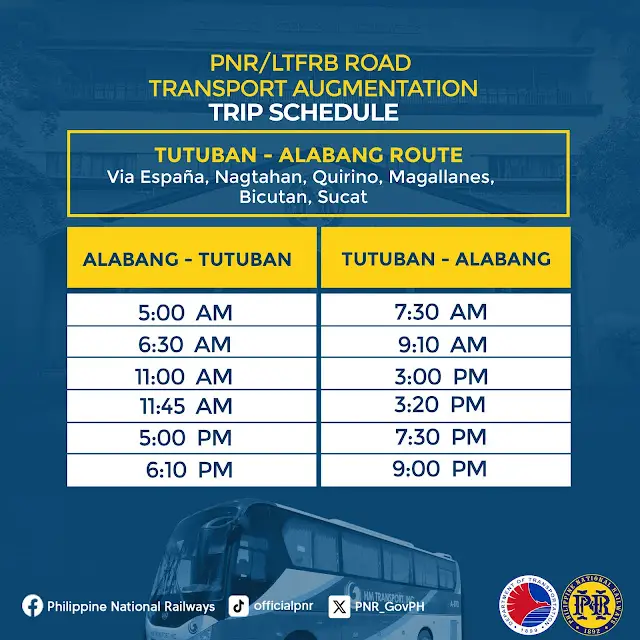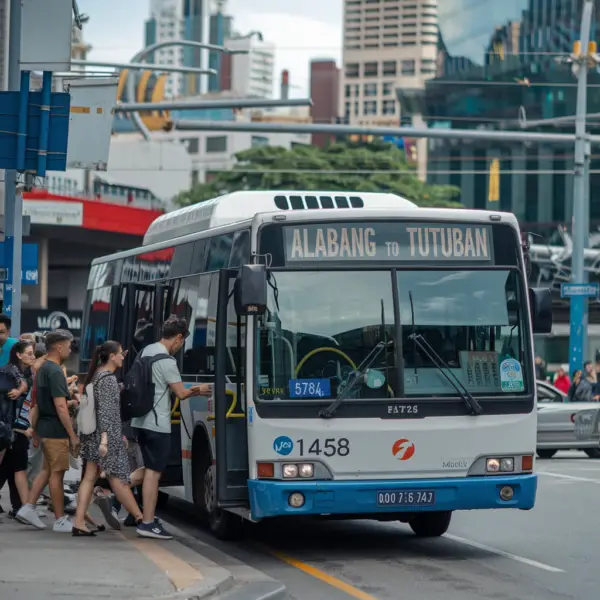Did you know that the Philippine National Railways (PNR) and the Land Transportation Franchising and Regulatory Board (LTFRB) have implemented an augmented bus service for the Alabang-Tutuban (Divisoria) route? This updated bus schedule comes as a significant development for commuters, ensuring a convenient and hassle-free journey to popular destinations along the route.
Staying informed about the latest bus timings and updates provided by the PNR and LTFRB is crucial for a smooth Divisoria commute. In this article, we will dive into the details of the Alabang-Tutuban bus schedule and provide you with important updates from the PNR and LTFRB regarding this augmented bus service.
Whether you’re a regular traveler or planning a one-time trip, knowing the bus schedule and understanding the changes made by the PNR and LTFRB will ensure that you have a stress-free commuting experience. So, let’s explore the Alabang-Tutuban bus schedule and the latest updates to make your journey along this route as seamless as possible.
Introduction to PNR/LTFRB Augmentation Bus Service
The PNR/LTFRB augmentation bus service is a temporary solution implemented to cater to the commuting needs of passengers traveling along the Alabang-Tutuban route. With the temporary suspension of PNR train services, this alternative bus service ensures that commuters can still travel conveniently between Alabang and Tutuban (Divisoria), providing essential transportation along this busy route.
The PNR/LTFRB augmentation bus service offers numerous benefits to commuters. It provides a reliable mode of transportation, ensuring that passengers can reach their destinations on time. The bus service operates on a regular schedule, allowing commuters to plan their journeys accordingly. Additionally, the bus service offers more flexibility in terms of pick-up and drop-off points, catering to the diverse needs of the passengers along the route.

The implementation of the PNR/LTFRB augmentation bus service is driven by a commitment to commuter convenience. By providing an alternative mode of transportation, the PNR and LTFRB aim to minimize the inconvenience caused by the temporary suspension of train services. This bus service ensures that commuters can continue their daily routines and travel seamlessly between Alabang and Tutuban, without significant disruptions or delays.
| Benefits of PNR/LTFRB Augmentation Bus Service | Commuter Convenience |
|---|---|
| Reliable mode of transportation | Ensures timely arrival at destinations |
| Regular schedule | Allows passengers to plan their journeys |
| Flexible pick-up and drop-off points | Caters to diverse commuter needs |
Understanding the North-South Commuter Railway Project Impact
The North-South Commuter Railway Project has had a significant impact on the operations of the Philippine National Railways (PNR) and has resulted in the temporary suspension of PNR train services. This suspension has caused disruptions in the commuting routines of countless passengers who rely on the PNR for their daily travel needs.
Reasons for the Temporary Suspension of PNR Train Services
The suspension of PNR train services is primarily due to the ongoing construction and development activities associated with the North-South Commuter Railway Project. The project aims to enhance and modernize the existing rail network, allowing for faster and more efficient travel between various locations in Luzon.
During this temporary suspension, the PNR is prioritizing the completion of critical infrastructure work required for the successful implementation of the new railway system. This includes the construction of new railway tracks, stations, bridges, and other necessary infrastructure.
While the suspension of PNR train services has undoubtedly led to inconvenience for commuters, it is important to recognize that these measures are being taken to improve and upgrade the existing transportation network. The temporary disruption in train services is a short-term sacrifice that will result in long-term benefits for commuters.
Strategic Developments in the North-South Railway Project
The North-South Commuter Railway Project is a strategic initiative aimed at transforming the commuting experience for passengers traveling between various locations in Luzon. The project encompasses the construction of a modern and efficient railway network, which will significantly reduce travel times and enhance overall connectivity.
Key developments in the project include the introduction of new railway stations, the installation of advanced signaling systems, and the upgrade of existing tracks to accommodate faster and more reliable train services. These developments will not only benefit passengers traveling along the North-South corridor but also improve interconnectivity between different regions and provinces.
The image above illustrates the impact of the North-South Commuter Railway Project on the transportation landscape. As various strategic developments come to fruition, commuters can expect a transformation in their travel experience, characterized by improved efficiency, comfort, and reliability.
In conclusion, the temporary suspension of PNR train services due to the North-South Commuter Railway Project has been an inconvenience for commuters. However, understanding the reasons behind this suspension and the strategic developments unfolding in the project can help commuters appreciate the long-term benefits that will result from these changes. The North-South Commuter Railway Project is a significant step towards creating a more integrated and efficient transportation system in the Philippines, and its impact on commuters will be invaluable.
Enforcement of the Bus Fare Matrix by the LTFRB
The Land Transportation Franchising and Regulatory Board (LTFRB) is committed to ensuring fair and reasonable commuting fares for passengers using the augmentation bus service. The implementation of a bus fare matrix plays a key role in achieving this goal, providing transparency and guidelines for bus operators to follow. By enforcing the bus fare matrix, the LTFRB aims to create a level playing field and prevent any unjustified fare increases.
The bus fare matrix sets clear fare structures based on the distance traveled, ensuring that commuters are charged fairly for their journeys. It takes into account factors such as the route, time of day, and type of bus, creating a standardized system that promotes consistency and affordability. This helps to eliminate confusion and disputes over fares, providing commuters with peace of mind and enabling them to budget their transportation expenses.
The LTFRB’s enforcement of the bus fare matrix is crucial in regulating the fares charged by bus operators. By strictly monitoring compliance, the LTFRB ensures that commuters are not being overcharged or taken advantage of. This helps maintain the integrity of the transportation system and fosters trust between operators and passengers.
Commuters can contribute to the fair and transparent fare system by familiarizing themselves with the bus fare matrix guidelines. By understanding the fare structure, passengers can make informed decisions and report any violations or discrepancies to the LTFRB. This collaborative effort helps to uphold fair commuting fares and improve the overall commuting experience for everyone.
| Distance (in kilometers) | Base Fare (in PHP) | Additional Fare per kilometer (in PHP) |
|---|---|---|
| 0-5 | 15 | 2 |
| 6-10 | 20 | 2.5 |
| 11-15 | 25 | 3 |
| 16-20 | 30 | 3.5 |
| 21-25 | 35 | 4 |
| 26 and above | 40 | 4.5 |
Bus Service Coverage and Stop Points
The augmentation bus service along the Alabang-Tutuban route provides extensive coverage and multiple stop points for the convenience of commuters. These buses operate on a fixed schedule, ensuring timely and reliable transportation for passengers traveling between Alabang and Tutuban (Divisoria).
To help commuters navigate the bus service effectively, here are some key details about the coverage and stop points:
Bus Service Coverage:
The bus service covers various locations along the Alabang-Tutuban route, enabling passengers to easily access different parts of the city. Whether you need to travel to Divisoria for shopping or to reach other destinations within the route, the bus service offers a convenient solution.
Some of the areas covered by the bus service include:
- Alabang
- BF Homes
- SM Sucat
- Baclaran
- Roxas Boulevard
- Tutuban (Divisoria)
These locations have designated bus stops where passengers can board and alight the buses, ensuring a seamless commute from start to end.
Stop Points:
The bus stops along the Alabang-Tutuban route are strategically located to provide easy access to major landmarks, transportation hubs, and commercial areas. Here are some of the notable stop points:
| Bus Stop | Location |
|---|---|
| Alabang | Alabang-Zapote Road |
| BF Homes | Sucat Road |
| SM Sucat | Dr. A. Santos Avenue |
| Baclaran | EDSA |
| Roxas Boulevard | Ermita |
| Tutuban (Divisoria) | C.M. Recto Avenue |
These stop points cater to the needs of commuters traveling to various destinations along the route. They are conveniently located and easily accessible, ensuring a smooth and efficient journey.
With this comprehensive coverage and well-placed stop points, the augmentation bus service offers a reliable transportation option for commuters traveling between Alabang and Tutuban (Divisoria).
Conclusion
In conclusion, staying updated with the Alabang-Tutuban bus schedule is crucial for a hassle-free commuting experience. With the implementation of the PNR/LTFRB augmentation bus service, passengers can conveniently travel between Alabang and Tutuban (Divisoria) even during the temporary suspension of PNR train services.
Understanding the purpose and benefits of the augmentation bus service provided by the PNR and LTFRB is essential for commuters. This temporary alternative ensures that passengers can reach their destinations without any inconvenience. By keeping informed about the bus schedule and any updates from the PNR and LTFRB, commuters can plan their journeys more effectively and avoid unnecessary delays.
It is also important to be aware of the impact of the North-South Commuter Railway Project on the suspension of PNR train services. This large-scale project aims to improve the overall commuting experience for passengers in the long run. By supporting these strategic developments, commuters contribute to the growth and enhancement of the transportation system in the Philippines.
Ultimately, the goal is to provide a hassle-free commuting experience for all passengers using the bus service. By adhering to the guidelines outlined by the LTFRB and understanding the bus fare matrix, commuters can ensure fair and reasonable fares. With a clear understanding of the bus service coverage and stop points along the Alabang-Tutuban route, passengers can navigate their journeys with ease and convenience.
FAQ
What is the purpose of the PNR/LTFRB augmentation bus service?
The PNR/LTFRB augmentation bus service is implemented to cater to the commuting needs of passengers traveling along the Alabang-Tutuban route during the temporary suspension of PNR train services.
Why are PNR train services temporarily suspended?
PNR train services are temporarily suspended due to construction and development activities for the North-South Commuter Railway Project.
What are the strategic developments in the North-South Commuter Railway Project?
The North-South Commuter Railway Project aims to improve the overall commuting experience for passengers by implementing construction and development activities along the PNR route.
How does the LTFRB enforce the bus fare matrix?
The LTFRB enforces the bus fare matrix to ensure fair and reasonable fares for commuters using the augmentation bus service.
What is the coverage of the augmentation bus service?
The augmentation bus service covers the Alabang-Tutuban route, with specific bus stops and locations where commuters can catch the buses and alight.
